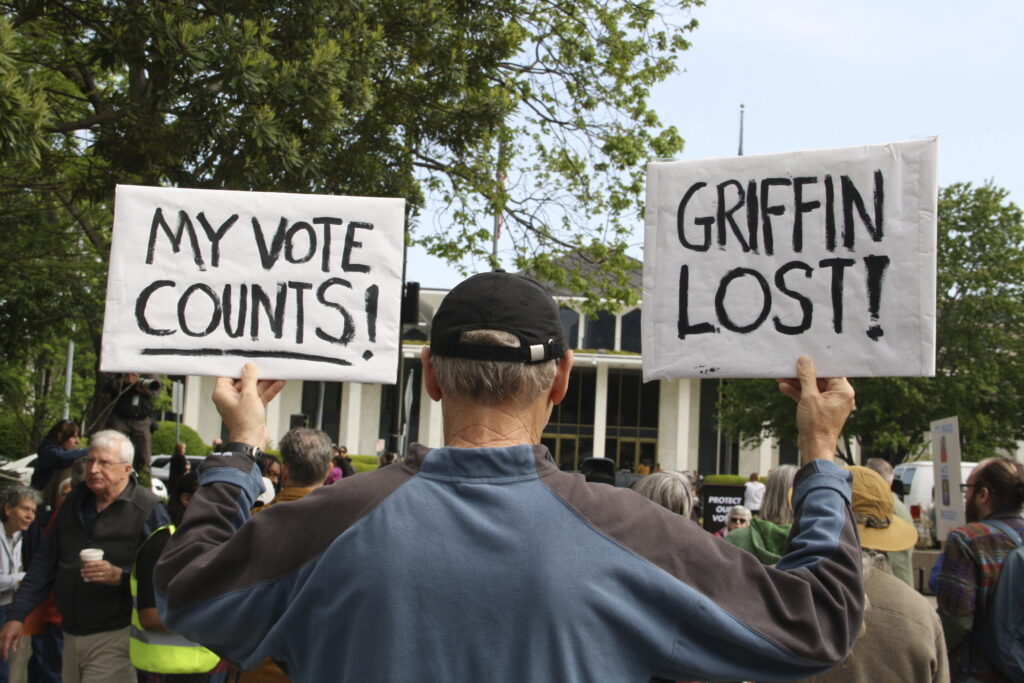
In a filing Wednesday evening, Jefferson Griffin — the Republican candidate seeking to overturn the North Carolina Supreme Court 2024 election results — asked the state appeals court to disenfranchise more voters by expanding the number of ballots included in the state’s cure process.
The move comes after state election officials put the number of ballots at risk of being thrown out in the state Supreme Court race at a significantly lower mark than the 5,000-plus previously thought to be at issue.
The North Carolina State Board of Elections said in a court filing Tuesday that 1,409 ballots from military and overseas voters from a single county — Guilford County — could be challenged. Challenges in other counties were invalid, the board said, because Griffin submitted the additional challenges after the state deadline.
The board also identified 266 “never residents” — voters registered overseas who allegedly never lived in North Carolina — a separate category of voters who risk disenfranchisement from the state Supreme Court’s ruling.
But Griffin wants the state to expand the number of curable and disqualifiable ballots, which means more than 5,000 ballots in November’s election could be retroactively tossed out — six months after voters lawfully cast their ballots. In Griffin’s latest court filing, he’s asking an appeals court to expand the pool of military and overseas ballots that need to be cured beyond Guilford County, to include similar ballots cast in five other counties — Buncombe, Cumberland, Durham, Forsyth and New Hanover.
Griffin also claimed there are more than 266 never-residents whose ballots should be disqualified. In his filing, he said he requested information on never residents from each county but only received information on 266 never residents provided by the state board by the time he filed his election protests in December. Griffin now wants the court’s order to apply to all never-residents, and not just the 266 originally singled out in his December protests. At least 16 of these voters identified as never residents actually did live in the state, according to one report.
In the elections board’s filing Tuesday, it outlined a plan to reach out to the 266 never-resident voters and give them a chance to confirm their residence status before their ballots are disqualified. Griffin’s latest filing wants the court to eliminate this cure process.
As Griffin’s latest actions in the ongoing legal saga over the election play out in state court, Supreme Court Justice Allison Riggs, a Democrat, is continuing her fight in federal court to ensure all votes are counted. On Wednesday, Riggs and several pro-voting groups filed motions in the 4th U.S. Circuit Court of appeals seeking to block the state from starting the cure process.
Per state court’s original ruling, the affected military and overseas voters and never-residents have 30 days to cure their ballots, or else they’ll be tossed out. In her motion, Riggs asked the 4th Circuit for relief by April 23 — the date she believes the state will start the cure process.
“Military and overseas voters followed all the rules and should not have to jump through additional hoops to have their votes count,” Riggs’s campaign said in a statement on the requested stay. “We are continuing to stand up for military voters in federal court to protect their constitutional right to vote — we are grateful to these brave Americans for their service and know that they deserve better than this. Justice Riggs took an oath to uphold the Constitution, and we will fight tooth and nail against any effort to disenfranchise even one single lawful voter.”
